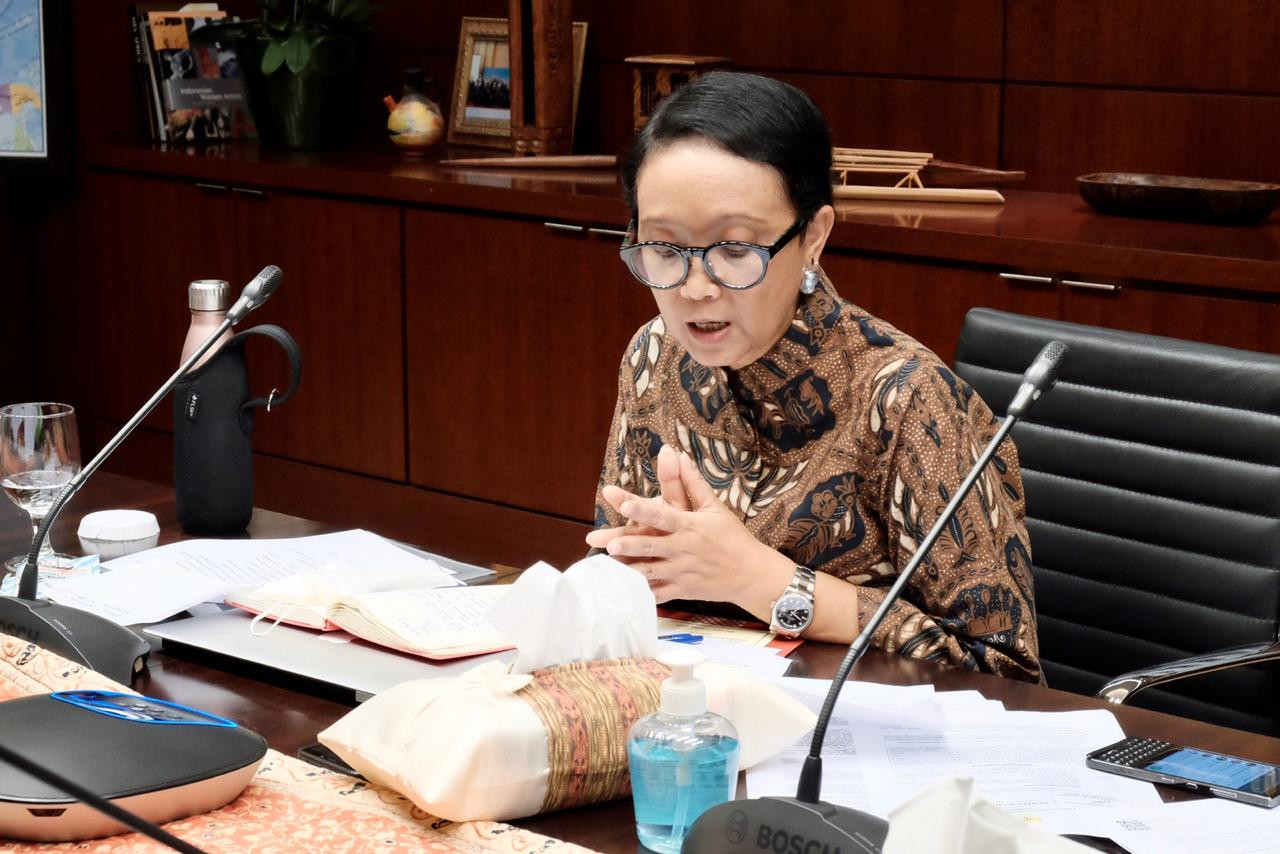Popular Reads
Top Results
Can't find what you're looking for?
View all search resultsPopular Reads
Top Results
Can't find what you're looking for?
View all search resultsIndonesian diplomacy shifts focus to national health security
Amid a global rush for vaccines, Indonesia has had to compete with countries rich and poor in order to secure enough vaccines to protect its people from COVID-19.
Change text size
Gift Premium Articles
to Anyone
I
ndonesia is determined to strengthen national health security as one of its main foreign policy priorities in 2021, following a year dotted by crisis after crisis brought about by the COVID-19 outbreak.
This was the biggest takeaway from Foreign Minister Retno LP Marsudi’s annual press statement on Wednesday, which was conducted virtually for the very first time due to the pandemic.
In this year’s iteration, Retno said the pandemic had forced several changes in the nation’s diplomatic priorities, including in the strengthening of protection for Indonesian citizens abroad, support for national COVID-19 response and contributions to maintaining world peace.
For this year, the minister said Indonesia’s diplomacy would mainly focus on strengthening national health security and supporting economic recovery.
“Indonesia’s diplomacy in 2021 will be focused on [building] self-sufficiency and national health security, among other ways, through realizing vaccine provision commitments from bilateral or multilateral cooperation,” she said on Wednesday.
Amid a global rush for vaccines, Indonesia has had to compete with countries rich and poor in order to secure enough vaccines to protect its people from COVID-19.
Retno herself has since August last year traveled the globe with State-Owned Enterprises Minister Erick Thohir to secure supplies for potential vaccines to inoculate the majority of Indonesia’s 267 million people.
Among the countries she has struck deals with are China, the United Arab Emirates and the United Kingdom.
According to the Health Ministry’s count so far, Indonesia has secured commitments for more than 300 million doses of potential vaccines sourced from both Chinese and Western vaccine producers, both in ready-to-use vials and in the form of bulk products.
Indonesia also expects to acquire vaccine candidates for up to 20 percent of the population through the COVAX Advance Market Commitment (AMC) mechanism, a United Nations-backed funding framework that aims to ensure developing and least-developed countries will get access to COVID-19 vaccines.
Retno has also repeatedly insisted that vaccines should be made a “public good”, underscoring the importance of equal access for all to safe and affordable vaccines.
Read also: Jokowi calls for equal vaccine access in UNGA address
Foreign policy scholar Dewi Fortuna Anwar warned that the issue of vaccine availability could very well mark the start of an impending inequality gap between wealthier countries who have the capacity to produce or procure vaccines and poorer countries who are not so fortunate.
“We don’t want to see only some countries get to inoculate their people only to fall into [vaccine] apartheid, where only some people get to travel and others have to remain in lockdown,” she told The Jakarta Post on Wednesday.
Besides procuring vaccines, the new foreign policy priority also sees Indonesia bolstering cooperation to develop the national health industry, including in active pharmaceutical ingredients, medical supplies and equipment, as well as research and development, transfers of technology and human resources development in the health sector.
More than a year after COVID-19 was first detected in China, the disease has killed more than 1.8 million people out of 84 million confirmed cases. Governments hope that recently approved vaccines can stem the spread of the virus and stop a cycle of economically crippling restrictions, which has shifted geopolitics globally, including in Indonesia.
As a means to support the nation’s economic recovery, the ministry had set out to make more travel corridor arrangements —deals that allow for continued cross-border mobility of essential services — as well as encourage inbound investments and complete various pending trade agreements with partner countries.
Dewi cautioned, however, that while the Foreign Ministry could set out as many goals as it wants, there would be nothing to show for it if the work of other ministries and government agencies does not match up to the ambitions.
“We can aim for more international trade, promoting tourism or have more cooperation, but it still depends on [the work of] other technical ministries,” she said.
Read also: Luhut’s US visit offers new dynamic in Indonesian vaccine diplomacy
With millions driven into poverty by the coronavirus-induced economic recession, countries will need to find a way to move beyond direct aid and reignite investment to stimulate growth, the World Bank said on Tuesday, after it downgraded its outlook on the global economy to just 4 percent growth this year, AFP reports.
Meanwhile, from a global health standpoint, epidemiologist Dicky Budiman from Griffith University in Australia is concerned that Indonesia’s testing capacity has yet to reach the expected level of international standards based on the size of the population and the severity of the outbreak in the country.
“We need cooperation with multilateral organizations or other countries to support the strengthening of testing and early detection strategies,” he told the Post.
Indonesia reported 8,854 new cases out of 44,734 test samples tested on Wednesday, reaching a positivity rate of 15.4 percent. The total number of confirmed cases in the country has surpassed 788,000 with 23,296 deaths, although the limits to testing suggest the scope of the crisis could be much bigger.
Wednesday’s annual press statement is viewed by Indonesia observers as a veritable shopping list of foreign policy priorities for the year.
Read also: Sovereignty remains a top foreign policy priority in 2020: Minister
In addition to the goal of national health security, Retno also aims to improve the overseas citizen protection system and advance various issues of regional and global importance, including the Rohingya crisis in Myanmar, the Palestine-Israel conflict and elusive peace in Afghanistan.
Its last foreign policy priority this year is to protect its sovereignty and territorial integrity through negotiations on various land and maritime boundaries.










